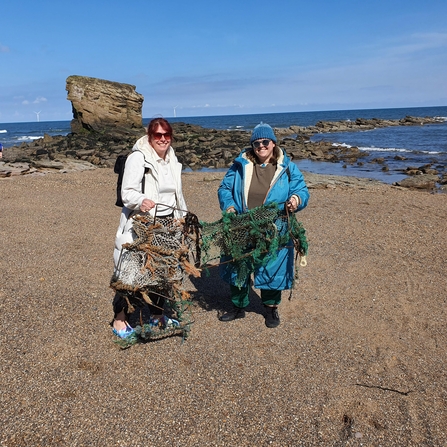Ghost nets aren’t supernatural, but they are legitimately scary.
I ain't afraid of no ghosts....
Each year, millions of marine creatures fall victim to ghost fishing. So, what is ghost fishing? Ghost fishing is what happens when derelict or discarded fishing equipment (for example nets, line, hooks and lobster pots) continues to ‘fish’, causing entrapment and entanglement, and then usually death. Ghost gear is one of the main forms of pollution affecting the oceans today!
Just a couple of weeks ago, me and a friend decided to spend the day at Collywell Bay Beach. When we arrived onto the beach, we noticed two lobster pots in the water trapped in the rocks, they were smashed and broken but still very capable of causing entrapment. We waded into the waist deep water and pulled them out onto shore, luckily no living creatures were inside of them. We dragged the heavy pots up to the entrance of the beach ready to be removed.

Katarina Martin and Rebecca Reece on Collywell Bay Beach with the two lobster pots that we pulled out of the sea. Image by: Katarina Martin.
Sadly, this is just one instance where I’ve found ghost gear. Last year whilst walking dogs with my friends on Blyth Beach, I found a huge mass of tangled rope, wire and net, I tried desperately to pull it out of the sand, but it was buried very deep. I reported it to Ghost Diving UK, who are part of the larger Ghost Diving Global, a charity set up to remove ghost gear from oceans all over the world. One of their volunteers came down to the beach the next day and used his truck to pull the tangled mess from the sand. It was then given to North Sea Rejects who make jewellery from the pollution!
The sad reality of the situation is that as long as the fishing industry booms, then so will the volume of ghost gear pollution. A lot of the nets fall to the ocean floor and get tangled on the rocks and corals; they then lie there in wait for their next prey. As you can imagine, the deeper, tangled nets are even harder to remove.
The persistent presence of ghost gear can disrupt ecosystems, impacting not only the trapped animal but also their predators and prey. Additionally, it can damage coral reefs and other sensitive habitats, further endangering marine biodiversity.Ghost Diving UK volunteer
It’s not just nets that cause issues, discarded hooks and fishing weights are commonly found around our coastline as well. On a dive in the water surrounding St Mary’s Lighthouse, me and the dive group found seven discarded fishing weights that had large metal spikes sticking out from them. Now, imagine the pain of standing on one of those!
As is the same with any form of pollution, there are small things that everybody could do. Helping with local litter picks can have a real impact. When at your local beach remove any ghost gear you might come across (if it's safe to do so), and if it’s too much to remove, report it to one of the charities set up for that exact reason! You can make more sustainable choices with your seafood, for example, choosing pole and line caught tuna instead of trawler caught. (The MCS UK website has lots of great resources for making more sustainable choices).
Hopefully next time you take a trip to the seaside, you don’t encounter any ghosts…
Blog by Katarina Martin (@underwaterkatie)

